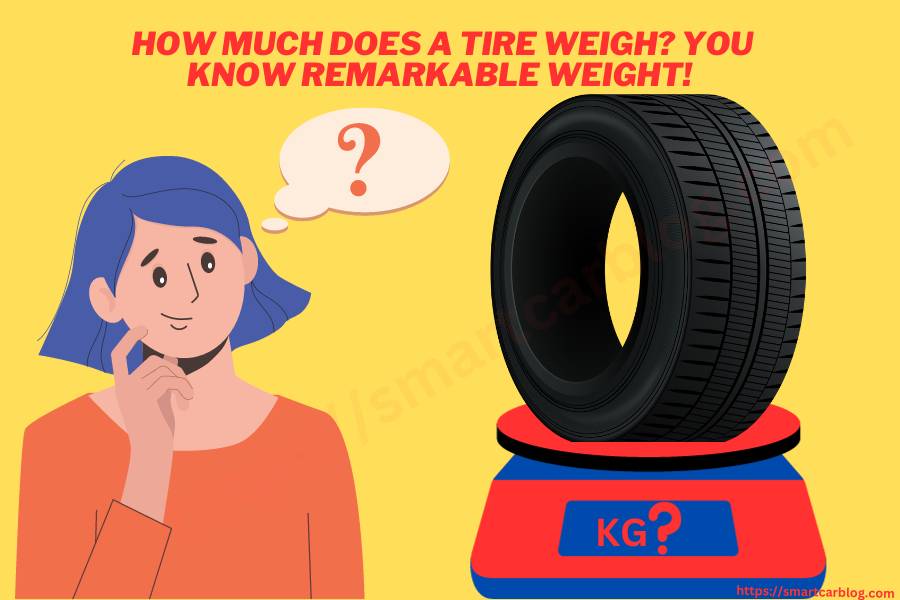The question “How much does a tire weigh?” may seem simple, but knowing the answer is crucial for anybody who drives a motor vehicle. A tire’s weight has an important effect on a car’s handling, safety, and fuel efficiency. It’s an unknown feature that affects both regular drivers and auto extremists, but it’s crucial.
Tire weight is important to know whether you’re shopping for new tires or you’re just interested in your car’s mechanics. The way these weights affect your driving experience—from handling to fuel efficiency—is more important than just the numbers.
You’ll learn things as we go into the finer points of tire weights that may change the way you drive and maintain your car. Discover the nuances around a clearly simple inquiry: how much does a tire weigh? Continue reading.
Table of Contents
ToggleHow important is tire weight?
Understanding tire weight is essential for both driving efficiency and safety. Innately, a tire’s weight can have an impact on a car’s handling attributes. While heavier tires may give superior strength and durability, particularly for bigger vehicles, lighter tires frequently offer better fuel economy and quicker acceleration.
Knowing the little things, such as “How much does a tire weigh?” makes it more comfortable to select the best tires for your car, ensuring both safety and maximum performance. Furthermore, the suspension system may be impacted by a tire’s weight, which could affect how comfortable driving is.
Why do tires need weights?
Tires need weights for a key reason: to ensure proper balance. When mounting a tire on a wheel, it may not achieve perfect balance, leading to vibrations and uneven tire wear. To counteract this imbalance, mechanics add small weights to the wheel rim. These weights balance the tire, enhancing driving quality and extending the tire’s lifespan.
This necessity highlights another aspect of the question, “How much does a tire weigh?” as the weight includes not just the tire itself but also these essential balancing elements. Properly balanced tires donate to smoother rides, increased fuel efficiency, and diminished strain on the vehicle’s suspension.
How does tire weight affect?
The weight of a tire affects several factors of vehicle performance. Firstly, it influences the vehicle’s acceleration and braking. Heavier tires require more additional energy to start moving and to stop, affecting fuel efficiency and braking space. In disparity, lighter tires contribute to faster acceleration and more responsive braking.
Also, tire weight plays a pivotal role in suspension dynamics. Heavier tires can cause more wear on suspension components, while lighter tires may not provide enough land traction, primarily in extreme driving conditions. Understanding these impacts is crucial when considering “how much a tire weighs” in regard to vehicle performance and safety.
Factors Influencing Tire Weight
When pondering the question, “How much does a tire weigh?” It’s important to consider various factors that influence this weight. The composition and design of a tire play a significant role. For instance, tires made for durability and off-road use generally weigh more due to their robust construction.
Lightweight tires, on the other hand, are frequently made for performance and speed. It also determines what kind of vehicle it is; tires for tiny vehicles often weigh less than those for heavy-duty trucks. By being aware of these variables, customers may choose the best tires for their needs by making better-informed judgments when making tire purchases.
New vs Used Tires: Weight Differences
The distinction between new and used tires is another aspect affecting their weight. New tires, fresh from manufacturing, tend to maintain their original specifications, including weight. However, used tires might weigh less due to tread wear and potential material degradation over time.
Even though it may appear insignificant, this weight differential can affect the efficiency and performance of the car. Owners of vehicles should be aware of how driving might be affected by this shift in tire weight from new to old, especially in terms of handling and fuel efficiency.
How Brands Affect Tire Weight
Different tire brands may approach tire weight differently, influencing the answer to “How much does a tire weigh?”. Some brands prioritise lightweight materials for better fuel efficiency and handling, while others focus on heavier, durable materials for longevity and rugged performance.
This variance in design philosophy means that a tire’s weight can significantly differ from one brand to another, even for tires of the same size. Consumers should consider their driving habits and vehicle requirements when choosing a brand, as the weight of the tire can subtly influence the overall driving dynamics.
The Relationship Between Tire Size and Weight
Lastly, the intimate correlation between the tire’s size and weight stems from the use of more materials in manufacturing larger tires, typically found on SUVs and trucks, making these tires heavier. On the other hand, smaller tires—found on sedans and compact cars—weigh less.
For both car manufacturers and owners, the link between tire size and weight is critical since it impacts driving dynamics, fuel economy, and even safety. Understanding this relationship helps in selecting the right tire size for specific vehicle models and driving conditions.
How Much Does a Tire Weigh?
It’s crucial to remark that there isn’t a universally suitable answer to the question, “How much does a tire weigh?” The size, kind, construction materials, and vehicle for which a tire is intended can all have a substantial impact on the tire’s weight. Every type of vehicle, from small automobiles to heavy-duty trucks, needs tires with unique properties and, thus, weights. This variability is essential for meeting the diverse demands of vehicle performance, safety, and efficiency.
Average Weight of Car Tires
The average weight of car tires is a topic of interest for many vehicle owners. Generally, standard passenger car tires weigh between 20 to 25 pounds each. Yet, this can vary depending on the tire’s size and type. For example, performance tires, designed for high speed and better grip, might weigh more due to additional materials for strength and durability.
Understanding this average weight is important for car owners, especially when considering replacements or upgrades, as it directly affects the vehicle’s handling and fuel economy.
Tire Weight by Type
Understanding how much a tire weighs is crucial for vehicle performance, safety, and efficiency. Different types of tires have varying weights, each designed to suit specific vehicles and driving conditions. Let’s explore the weight differences among various tire types.
Passenger Car Tires Weigh
Passenger car tires are developed for typical vehicles like sedans, SUVs, and minivans. Generally, these tires weigh between 20 and 30 pounds each. The weight is optimized to provide a balance between fuel efficiency and traction, making them ideal for regular road use.
Run-Flat Tires Weigh
Run-flat tires, known for their ability to function even after a puncture, weigh slightly more than standard passenger tires. On average, a run-flat tire can weigh about 25 to 30 percent more. This added weight comes from the reinforced sidewalls that allow driving for a limited distance, even after air loss.
Commercial Truck Tires Weigh
Commercial truck tires are substantially heavier due to their larger size and the need to support heavier loads. These tires can weigh anywhere from 100 to 200 pounds. The heavyweight contributes to the tire’s durability and ability to handle long-distance hauling.
Trailer Tires
Trailer tires, designed for towing and high load capacities, usually weigh between 40 to 60 pounds. The weight ensures they can handle the stress of carrying heavy loads while maintaining stability on the road.
Tractor/Farm Machinery Tires
Among the heaviest in the tire category, those designed for tractors and farm machinery can weigh over 400 pounds. Their substantial weight and robust design are vital for agricultural tasks, ensuring stability and traction across diverse terrains. If you’re wondering, “How much does a tractor tire weigh?” it varies, but their weight is indeed a critical factor in their performance on the field.
All-Terrain Tires Weigh
All-terrain tires can help loads ranging from 30 to 50 pounds and are suitable for both off-road and on-road use. They are capable of offering a mix of traditional driving nicety and off-road toughness because of their weight.
ATV Tires
ATV tires, designed for all-terrain vehicles, are relatively light, weighing about 20 to 30 pounds. Their lightweight design enhances maneuverability and performance in diverse terrains.
Off-Road Tires
Off-road tires, used for rugged terrain and challenging landscapes, typically weigh between 30 to 80 pounds. The weight supports their aggressive tread patterns and robust construction, essential for off-road adventures.
Monster Truck Tires Weigh
Monster truck tires are extremely heavy, with each tire weighing as much as 800 pounds. This immense weight supports the gigantic size and the extreme conditions under which these vehicles operate.
Winter Tires Weigh
Winter tires, designed for snowy and icy conditions, usually weigh the same as standard passenger car tires, around 20 to 30 pounds. The weight is similar, but the tread design and rubber compounds are specifically tailored for cold weather grip and handling.
Truck Tire Weight: Heavy-Duty Insights
Truck tires are significantly heavier than standard car tires, reflecting their design for durability and heavy-load capacity. On average, a truck tire can weigh anywhere from 30 to 80 pounds, with some heavy-duty truck tires surpassing this range. This added weight is necessary to ensure these tires can withstand the demands of hauling heavy loads and traversing challenging terrains. Truck drivers and fleet managers must consider this weight factor for optimal vehicle performance and safety.
Motorcycle Tire Weight: Light and Agile
Motorcycle tires, in contrast, are lighter and more agile, aligning with the needs of motorcycle dynamics and performance. These tires usually weigh between 10 and 20 pounds, a range that facilitates quick acceleration and agile handling. The lighter weight also contributes to the overall efficiency and ease of maneuverability of motorcycles, making tire weight a key consideration for riders looking for performance and safety.
Impact of Tire Weight on Performance
Understanding the impact of tire weight on performance is crucial for anyone interested in automotive dynamics. The query “How much does a tire weigh?” goes beyond a very constitution; it directly relates to how a vehicle behaves on the road. Tire weight can impact various aspects of performance, including acceleration, handling, braking, and actual fuel efficiency.
The type of vehicle and its intended use largely dictate whether heavier or lighter tires are more beneficial, making it a significant consideration for both car manufacturers and vehicle owners.
Vehicle Performance and Tire Weight
The relationship between vehicle performance and tire weight is intricate. Heavier tires tend to provide better traction and stability, which is particularly advantageous for larger vehicles or those designed for off-road use. However, the increased weight can negatively impact acceleration and fuel economy.
Lighter tires, conversely, can enhance a vehicle’s responsiveness and improve its ability to accelerate and maneuver. For everyday drivers and enthusiasts alike, understanding this balance is key to optimizing a vehicle’s performance based on individual needs and driving conditions.
Lightweight Tires for Racing: The Need for Speed
In the high-octane world of racing, the weight of a tire becomes a critical factor. Lightweight tires are a fundamental requirement in this arena, where every ounce matters. These tires decline the overall unsprang weight of the vehicle, allowing for faster acceleration and more agile handling — requirements in the race for speed and efficiency.
The reduced weight also allows for more accurate cornering and braking, giving racers an edge over competitors. For racing professionals and specialists, investing in lightweight tires is not just a choice but essential for achieving top performance on the track.
How to Measure Tire Weight?
Measuring the weight of a tire is a straightforward process but requires the right tools. To accurately determine “how much a tire weighs,” you’ll need a reliable scale. First, ensure the tire is clean and free of debris. Place it on the scale and record the weight. It’s important to measure each tire separately for precision, especially when considering replacements or upgrades for your vehicle.
Why Tire Weights are Essential for Balance
Tire weight plays a crucial role in vehicle balance and performance. Balanced tires ensure smoother rides, less wear on the vehicle’s suspension, and improved fuel efficiency. When tires are not balanced, it can lead to uneven tire wear, vibrations, and potentially hazardous driving conditions. Regularly checking and maintaining tire balance, which directly relates to their weight, is vital for optimal vehicle performance and safety.
The Pros and Cons of Smaller and Bigger Tires
When considering tire size, understanding the pros and cons of smaller and bigger tires is essential. Smaller tires, generally lighter, can improve fuel efficiency and handling. They are often more responsive and provide better acceleration. On the other hand, bigger tires, which weigh more, offer better traction and stability, which is especially beneficial for off-road and rugged conditions.
However, they can reduce fuel efficiency and may affect the vehicle’s speedometer and odometer readings. Choosing the right tire size and understanding “how much a tire weighs” in each category is crucial for aligning with your driving needs and vehicle specifications.
Final Thought: How Much Does a Tire Weigh?
Finally, tire weight affects vehicle performance, safety, and efficiency. This exploration has covered tire weight measurement, balancing, and size factors.
Measuring tire weight is simple, but it’s critical to vehicle performance. Understand tire weights to balance tires for smoother rides, longer life, and better fuel efficiency. Unbalanced tires cause uneven wear, vibrations, and safety issues.
The weight of smaller and larger tires is important when choosing sizes. Lighter tires improve fuel efficiency and handling, but heavier tires improve traction and stability, especially on difficult terrain.
The inquiry “How much does a tire weigh?” goes beyond curiosity. This crucial information helps drivers, mechanics, and enthusiasts choose tires. Understanding tire weight and its effects can improve your driving experience and make trips safer and more efficient.
Remember that tire weight is important in automobile engineering while you work on tires. With this knowledge, you may drive confidently, knowing that your tire decision is well-informed and meets your demands.
FAQ: How Much Does a Tire Weigh?
Q: How do you calculate wheel weight?
A: A wheel’s weight is determined by taking the combined mass of the tire and the rim. For measuring wheel weight, a regular weighing scale suffices; just ensure the entire wheel rests on the scale to guarantee a precise measurement. Typically, wheel weights are expressed in either pounds or kilograms.
Q: Are heavier or lighter tires better?
A: Whether heavier or lighter tires are better depends on the vehicle and its intended use. Lighter tires improve fuel efficiency and handling, while heavier tires can offer better traction and durability, especially for off-road or heavy-duty vehicles.
Q: Why are smaller tires better?
A: Because they increase the vehicle’s mobility and fuel efficiency, smaller tires are sometimes thought to be preferable for driving in cities. Additionally, they often have less rolling resistance, which, in some circumstances, might improve performance.
Q: Are heavier tires bad?
A: Although they are not always detrimental, heavier tires might have an impact on a car’s acceleration and fuel efficiency. Usually, they are reserved for certain uses, such as off-road driving or heavy-duty vehicles.
Q: Why are bigger tires better?
A: Bigger tires can be better for off-road driving as they provide more ground clearance and can handle rough terrains better. They also contribute to a smoother ride over bumps and are often preferred for their aesthetic appeal on certain vehicle models.
Q: Do all tires weigh the same?
A: No, all tires do not weigh the same. The weight of a tire depends on its size, construction material, and type (e.g., passenger car tire, truck tire, etc.). Different types and sizes of tires are designed to meet specific vehicle requirements.
Q: Does weight affect tires?
A: Yes, weight has a big impact on tires. Being overweight can have a negative impact on handling and braking, increasing wear and tear and fuel consumption.
Q: How much does a tire weigh in kg?
A: The weight of a tire in kilograms varies depending on its type and size. On average, a standard car tire weighs approximately 7 to 12 kilograms, but this can vary widely.
Q: How many kg is a truck tire?
A: A typical truck tire can weigh anywhere from 30 to 80 kilograms, depending on the size and type of the tire. Larger and more robust truck tires designed for commercial use can be even heavier.
Q: Do tires have a weight limit?
A: Yes, the maximum weight that tires can support safely is known as their weight limit. The load index of the tire—a numerical value that represents the maximum weight the tire can support—determines this restriction.
Q: What do tire weights look like?
A: Tire weights are small, often metal objects that are attached to the wheel rim. They are used to balance the wheel and tire assembly for a smoother ride. They come in various shapes and sizes, typically in the form of small rectangular or strip-like weights.




 Welcome to SmartCarBlog.com! I’m Rashel Miajee, The proud founder of smartcarblog.com. This is a part of
Welcome to SmartCarBlog.com! I’m Rashel Miajee, The proud founder of smartcarblog.com. This is a part of 


